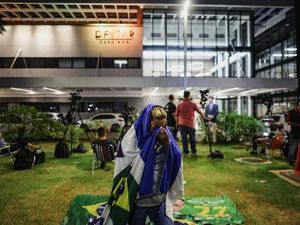A federal jury has convicted former Louisville Metro Police Department (LMPD) officer Brett Hankison of violating the civil rights of Breonna Taylor, whose death during a police raid on her apartment sparked nationwide protests demanding police reform. The jury found Hankison guilty of using excessive force, marking the first time any officer involved in the March 2020 botched drug raid has been held accountable for their actions.
Hankison, 47, was convicted after the jury deliberated for more than 20 hours over three days. Earlier, they had cleared him of another charge concerning the use of excessive force against Taylor's neighbors. The verdict, announced late on the evening of November 1, 2024, symbolizes a hard-fought moment for justice amid what’s been described as long-standing systemic issues within law enforcement.
During the raid, Hankison fired ten shots through the window and door of Taylor’s apartment, actions he claimed were motivated by self-defense when Taylor’s boyfriend, Kenneth Walker, shot at the officers, believing intruders were breaking down the door. Although none of Hankison’s bullets struck Taylor, the chaos he contributed to led to her being hit fatally by another officer's gunfire.
“Breonna Taylor’s life mattered,” said Kristen Clarke, Assistant Attorney General for the Justice Department’s Civil Rights Division, after the verdict was read. “This verdict recognizes the violation of Ms. Taylor’s civil and constitutional rights and brings some small measure of comfort to her family.”
Reflecting on the verdict, Tamika Palmer, Taylor's mother, expressed feelings of relief. After hearing the decision, she exclaimed, “Thank God, thank God,” noting the long struggle to reach this point, saying it had been over 1,600 days since Taylor’s death and the lengthy process of seeking justice.
“This was hard, but I knew it would happen,” Palmer added, speaking to the gathered crowd outside the courthouse.
The ordeal began on March 13, 2020, when plainclothes officers executed a “no-knock” search warrant at Taylor’s apartment, believing it was being used for drug trafficking linked to her former boyfriend. Walker, armed and startled by the sudden entry of officers, fired once, hitting Sgt. John Mattingly. The officers retaliated, shooting 32 rounds, with one bullet fatally wounding Taylor as she lay asleep.
While the other officers involved—Myles Cosgrove and John Mattingly—were not charged, their use of deadly force was considered justified by prosecutors since they acted after Walker shot at them. Hankison's actions, which included shooting without seeing his target, drew scrutiny not only for their recklessness but also for potentially endangering lives beyond those of Taylor and her boyfriend by firing blindly.
Evidence presented at trial, including testimonies from law enforcement officials, indicated LMPD policy dictates officers should not discharge their firearms at targets they cannot visualize. This fundamental principle, they argued, was violated by Hankison. The SWAT team commander openly expressed shock upon learning of Hankison's actions during the fateful event.
"What happened here is tragic and unacceptable," declared U.S. Attorney for the Western District of Kentucky, Mark Metcalf. He emphasized the importance of upholding civil rights, stating the Justice Department is committed to ensuring such rights are preserved for every individual.
Hankison’s legal challenges are not over. He faces sentencing on March 12, 2025, with potential penalties reaching up to life imprisonment. Depending on mitigating circumstances considered during the sentencing process, the judge may impose another sentence, but the conviction marks him as the first officer convicted for actions related to Taylor’s death.
Public reaction to the conviction has been mixed, as residents of Louisville process the significance of the verdict. Some view it as a beacon of hope for police accountability reforms, whereas others harbor skepticism about the broader impact this case may have on systemic issues within the police force.
“It’s about time we start seeing changes,” noted Rocqual Pickett, a lifelong Louisville resident, as she reflected on Taylor’s legacy and its connection to the racial justice movements across the United States. “But we need more than convictions; we need real change.”
Calls for police reform were amplified after Taylor’s death, fitting within the broader narrative of the Black Lives Matter movement which gained significant traction following the police killing of George Floyd just months later. Protests erupted nationwide as many pushed for changes not only to how police operate but also to the training they receive concerning race awareness and civil rights.
After Taylor's death, Louisville implemented several police reforms, including the ban of no-knock warrants—a policy Hankison participated in during the raid. Supporters of police reform hope Hankison's conviction fosters positive change and encourages accountability among those who wield significant power over the lives of the citizens they are meant to protect.
Two other officers, former Detective Kelly Goodlett and Sergeant Kyle Meany, have also faced legal consequences connected to falsifying the search warrant used to enter Taylor’s apartment. While Goodlett has pleaded guilty to her charges, Meany and another officer await trial. The retribution sought by Taylor’s family against those decisions continues as they stress the need for justice—which, according to advocates, starts with holding law enforcement accountable.
"It’s easy to forget names when they are just data points on the news, but it’s moments like these we must cherish to remind ourselves of why we fight for justice for the lives lost,” Bernice King, civil rights activist and daughter of Martin Luther King Jr., stated. She urged communities to keep Taylor’s name alive as the fight for civil rights wages on.
“May her memory serve as both comfort and motivation for continued progress against inequities,” King concluded.



